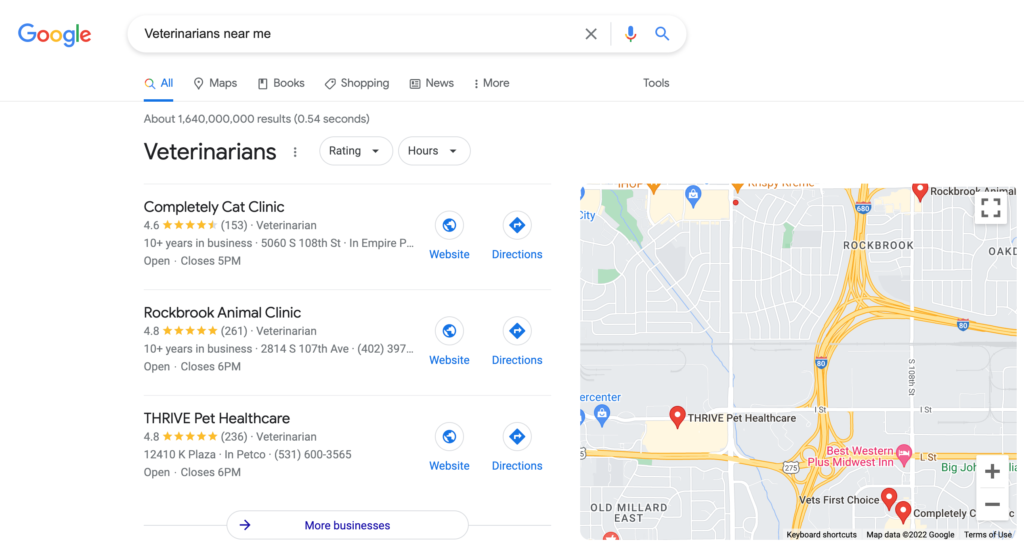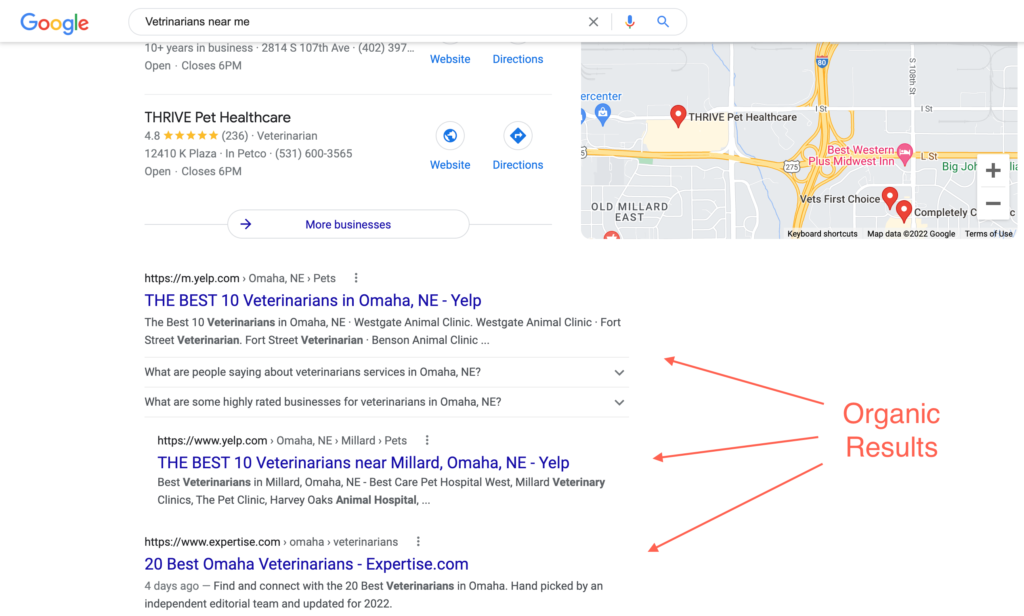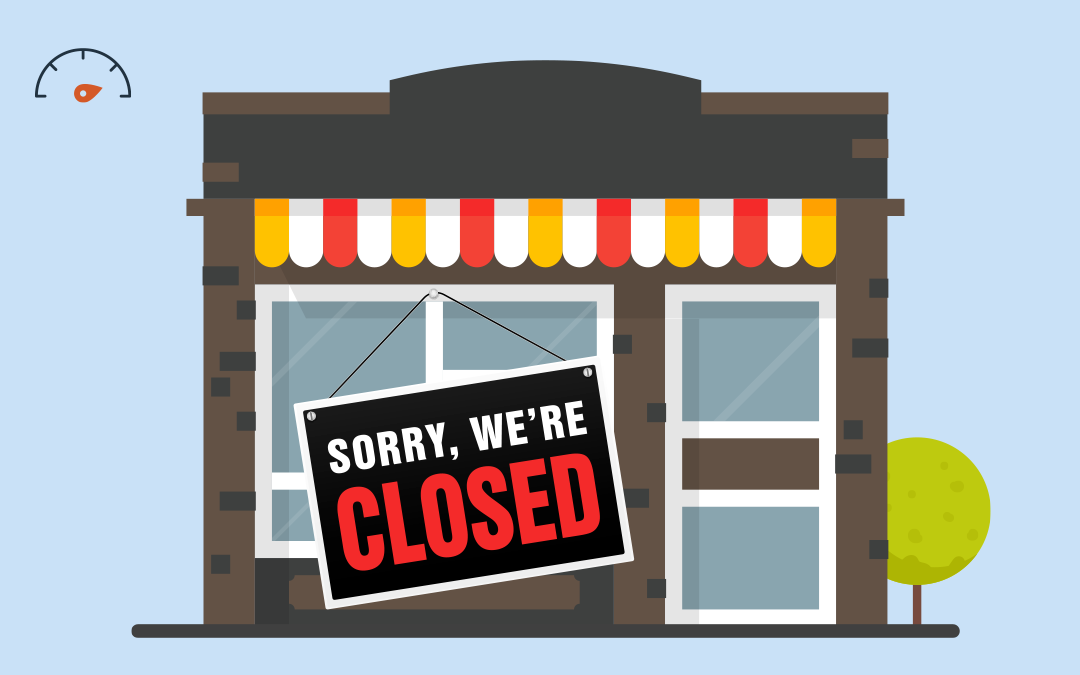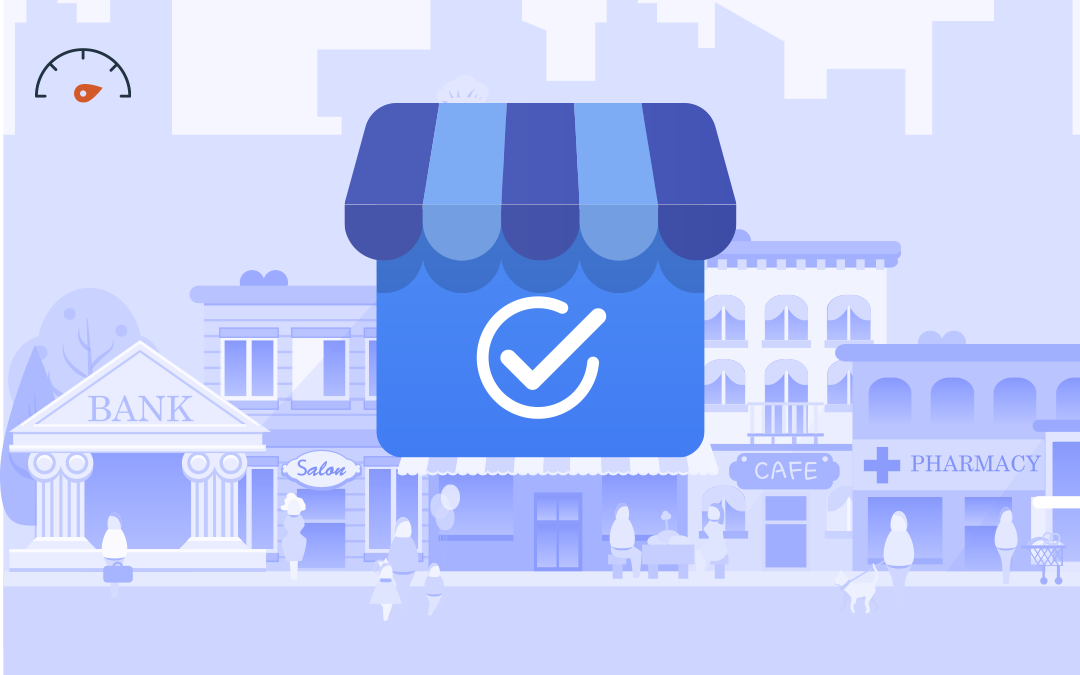If you want to find more customers online for your local business, you need to have a website optimized for local search. Organic search engine optimization is the key to rising in search rankings and creating more consumer impressions. Here are a few SEO tips to optimize your website to help thrive in local search.
What Are Local Search Results?
Local search results are the sections of Google search engine result pages (SERPs) and Google Map results that only display local listings. These will appear in any search that contains a local intent. Local searches can be specific like “the best restaurants near me” or broader like “amusement parks.” Let’s take a look at two of the most prominent local search results.
Google Map Pack
The Google Map Pack is the section at the top of SERPs that features local business listings, along with their location pins on a map. Only three local businesses can appear on the Google Map Pack based on various factors like proximity to the user, average ratings, business categories, and more.

Local Organic Results
Local organic search results are all of the remaining unpaid search results on SERPs. Any website can compete for rankings in local organic results, which can make it difficult for local businesses to find success. Instead, it’s common for alternative directories like Tripadvisor or Yelp to rank at the top of these search results because they often have high domain authorities.

Local businesses can try to compete in these areas by creating additional content like blogs, using local keywords throughout their website copy, and earning high-quality backlinks on reputable sources. You can even build a local citation on specialized directories with your website link to help you in local organic search results.
On-Site Optimization
There are quite a few aspects of website optimization that you need to handle on your own site before you start to optimize elsewhere. Here are a few ways to optimize your website to boost your performance in search engine results.
Local Keyword Optimization
Local keywords help optimize the content on your website. Generally, local keywords target phrases with your service area and the product or service you provide.
For example, if you offer tutoring services in Cleveland, you could use phrases like:
- Tutoring services in Cleveland
- Cleveland tutors
- Tutors in Cleveland
- Best tutors in Cleveland
These keywords will help your website appear as an unpaid result when locals search for your business or services online. Some of the best places to use local keywords are page titles, content headers, meta information, and sparingly throughout your body content.
Quality Content on Your Website
One of the best ways to impress Google and drive people to your website is by consistently creating high-quality content.
To create quality content on your main webpages, you should use main keywords, establish the tone of your business, and quickly introduce your products or services. Then, you can spend more time building links, optimizing for keywords, and diving deeper into your products or services with blog content.
Not only does quality content make your business look more knowledgable to both consumers and Google, but it also gives you more opportunities to pop up in local and organic searches. For example, if someone is looking for “best hair products for thinning hair,” they may not find your barbershop’s home page on a SERP, but they could find a blog you’ve written on the topic.
Location Pages
Location pages are webpages dedicated to your specific service areas. They can help improve your website’s domain authority, improve your customer’s experience, and rank higher in local search.
When should your business use location pages? If you serve many areas (like a small storage company in California with facilities in Pasadena, Glendale, and north Los Angeles), you should set up keyword-optimized location pages. While your homepage might not rank for searches like “storage in Pasadena,” your individual location page for Pasadena might!
Service/Product Pages
Just as having a specific location page can help you find more success online, the same can be said for individual product and service pages. If you are a local dentist that offers check-ups, teeth whitening, and orthodontist services, you’ll want to create specific pages for each of these services.
This gives you an opportunity to appear in more searches with local intent. Searchers that use queries like “teeth whitening near me” may not find you in local organic search results if you don’t have a teeth whitening service page.
Once Google indexes your website and understands what you offer, you may rank in local search results for specialized searches like “teeth whiteners.” If done right, these webpages can also be great for user experience because you’re providing more in-depth information about what you offer, why it’s beneficial, and what the customer needs to do to use your product or service.
NAP Information on Your Site
NAP information is your business’ name, address, and phone number—essential information that potential customers need to contact your business.
A well-rounded online profile needs to have consistently accurate NAP information available in as many places as possible, especially on your website. If your NAP information is easily accessible on your website, users can easily locate the information they need to contact your business, and search engine bots can validate your NAP info matches up with what they’re finding elsewhere on the web.
Meta Data
Meta titles and meta descriptions act as concise summaries of your webpages. They appear on your Google listing, not directly on your website. Meta information can make a big difference in driving click-throughs to your website and your overall ranking performance.

Meta descriptions need to be unique and include keywords to give your webpages the best chance of earning higher rankings and driving click-throughs.
Schema Information
Schema markup is the code that helps search engines crawl and index your website. Google only reads schema in a specific coding language, so if you are concerned about setting the schema for your website, talk to the site’s developer or an agency with experience optimizing websites to add the proper schema to your site.
When would a small business use schema for its website? If you have a list of events that your business is hosting, you can use schema markup to share that list with Google. This, in turn, gives the search engine more information to present to searchers. So if someone is looking for the events you offer, Google may show upcoming events directly on your Google listing, making it easier to gain searchers’ interest and drive them to your site.
Internal Linking
Google wants your website to be easy to use, and internal links improve website navigability. An internal link is when you direct users onto another of your pages with relevant content. With internal links, users can visit various pages in one session and engage with your content.
This is when product or service pages can benefit your website. If you are discussing a specific product or service briefly on your homepage, this is a great opportunity to link to the specific product or service page. This gives the user easy access to more information and more of your site.
Internal links are also essential for your on-site calls to action. Link to the landing page where users can complete the conversion you are looking to drive. For example, if you want to boost sales, link to a page where the customer can start the transaction. If you want people to contact you, link to a contact page where the user can get in touch with you in as few clicks as possible.
Reviews on Your Site
Reviews are huge for Google rankings. The search engine uses reviews to crowd-source vital information about your business, helping to determine if it should suggest you to users.
The more reviews you earn in different locations, the better. Take advantage of this by adding some of the best reviews on your site as testimonials and include a place for people to give feedback directly on your website.
Not only do the reviews provide more crowd-sourced material, but they also show Google that you take customer satisfaction seriously, which can help you earn better rankings. Just be sure you have website schema that tells Google where the reviews are on your site.
Off-Site Optimization
Once you’ve optimized your website for local search, turn your attention to off-site optimization. Here are a few ways to optimize off-site to boost your website’s performance.
Google Business Profile Optimization
You first need to get people to your site before you can win them over. To increase website traffic and boost your chances of appearing in local search results, start by claiming, completing, and optimizing your Google Business Profile (formerly known as Google My Business).
Almost all of the information that appears on your business listing comes from your Google Business Profile. Tools found on your profile like Google posts and Google reviews give you additional opportunities to earn higher search rankings and find more customers.
Check out a few resources to learn about how you can further optimize your Google Business Profile:
- 14 Tips to Improve Google Business Profile Ranking & Performance
- How to Choose The Best Business Category on Google
- A Basic Guide to Google Business Profile Q&As
- How to Get the Most Out of Your Google Business Profile Photos
- How to Create & Manage a Service-Area Listing on Google
- How to Delete a Google Review
Citation Building
Building local citations includes getting your NAP information on as many reputable websites as possible. One of the best ways to start building citations is by submitting your NAP information to local data aggregators. These aggregators are middlemen that send your information to hundreds of websites across the web.
Some of the most popular data aggregators include:
- Data Axle
- Foursquare
- Neustar Localeze
Another great way to get your information on high authority sites is to list your information on search directories. Submitting your NAP info to core directory sites not only improves your chances of being found on those directories, but it can also help improve your Google search ranking.
Some popular directories are:
- Apple Maps
- Better Business Bureau (BBB)
- Bing Places
- Yellow Pages
- Yelp
It’s also good to verify your information on industry-specific sites like Angie’s List, Tripadvisor, and Homeadvisor. These industry-specific directories get your NAP data on even more high-quality sites and further improve your chances of being found by users.
Inbound Links
One of the more challenging aspects of off-site optimization is getting high-quality, non-directory sites to link to your website. It is a violation of Google guidelines to buy links, so this practice could result in the search engine suspending your business listing. You have to earn links organically.
How does your website gain inbound links? While there are plenty of strategies to earn more inbound links, nothing is guaranteed. The biggest tip for winning backlinks is to create high-quality content worthy of linking.
You can start by blogging consistently. If you produce lots of high-quality content, people are more likely to link to those valuable webpages.
Once your blog is more established, try creating enticing content that people will actually want to mention in their posts. This might include area guides with local business recommendations, industry resource lists, or guest blogs on non-competitive sites.
Another way to earn inbound links is to partner with related businesses (that aren’t your competitors) and link to each other’s websites whenever possible.
Want to take your on and off-site website optimization to the next level? Local Search Fuel by Hurrdat has small business website building and optimization services that can help you grow your business organically. Get started today!



